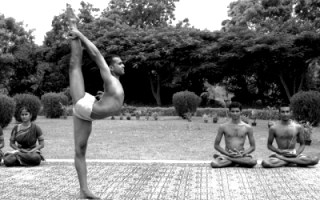Jan Schmidt-Garre has found the creative process as a constant draw and his production company has presented music and the arts on film since its formation. The director’s output – whether factual or narrative – has been preoccupied by concert, opera, theatre, and dance. After his wife began to practice it, Schmidt found himself similarly drawn to the artistic and performance aspects of the ancient Indian philosophy of yoga. This prompted a journey to explore not just the forms and teachings of spiritual tradition, but where its modern incarnation originated; it is a search that makes up his latest documentary, Breath of the Gods (2013).
His investigation led him quickly to Sri Tirumalai Krishnamacharya, the man widely regarded as the ‘father of modern yoga’. A picture of this influential teacher and scholar, who lived to the age of one hundred, is gradually painted through the recollections of prominent students and family. Two of his pupils have gone on to become enormously important teachers in their own right, Pattabhi Jois and B.K.S. Iyengar. Both men, who have continued to teach and practice will into their nineties, have been instrumental as yoga has spread to the west.
 As is remarked in one of the moments in which they share the screen, Jois and Iyengar both learned yoga for free – yet now westerners are willing pay through the nose for the privilege. The personal reflections of the various individuals give a sense of the significance that the philosophy has in their own lives as well as that of Krishnamacharya. Inserted alongside these musings are beautifully shot demonstrations of a variety of wince-inducing ‘asanas’ (body positions) and archive snippets of Krishnamacharya himself, completing his daily routine. Tribute is also paid to the Maharajah who supported the teaching of yoga and the school. Undoubtedly there are swathes of this that will appeal more to yoga enthusiasts than lay men.
As is remarked in one of the moments in which they share the screen, Jois and Iyengar both learned yoga for free – yet now westerners are willing pay through the nose for the privilege. The personal reflections of the various individuals give a sense of the significance that the philosophy has in their own lives as well as that of Krishnamacharya. Inserted alongside these musings are beautifully shot demonstrations of a variety of wince-inducing ‘asanas’ (body positions) and archive snippets of Krishnamacharya himself, completing his daily routine. Tribute is also paid to the Maharajah who supported the teaching of yoga and the school. Undoubtedly there are swathes of this that will appeal more to yoga enthusiasts than lay men.
Discussions of technique and the underlying philosophy can run a little long if viewers are not especially engaged with the subject matter but the is largely avoided through the films deceptively leisurely pace. By breaking from interviews to show the bewitching spectacle of masters at work, the film almost envelopes the viewer in its subject languid and reflective aura.
“When you enter that state there is a deep peace, a deep centered-ness, and I would say that there is an increase of clarity from within – when all the chatter of the mind calms down.” This may well have been a description not of Breath of the Gods‘ subject, but the film itself. Whilst enthusiasts and those with a pre-existing interest will certainly take more away from the film, it provides enough interesting material throughout and in fact proves a strangely soothing and relaxing experience in itself.
Ben Nicholson


